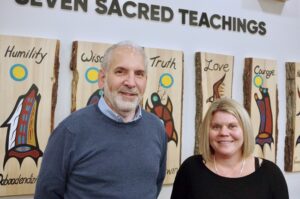Land-based learning through a Biigtigong Nishnaabeg lens coming to Thunder Bay

By Rick Garrick
THUNDER BAY — Anishinabek Employment and Training Services (AETS) is partnering with Biigtigong Nishnaabeg and two organizations to deliver a land-based learning conference and two high school courses over the next month-and-a-half.
AETS and the Biigtigong Nishnaabeg Education Department are partnering to deliver a Fundamentals of Land-Based Learning from a Biigtigong Nishnaabeg Lens conference on Nov. 11-12 at the Best Western Plus NorWester Hotel and Conference Centre in Thunder Bay.
“[We’re] basically sharing our story regarding the transformation of programs within our community school,” says Lisa Michano-Courchene, director of education at Biigtigong Nishnaabeg. “We’ve been doing quite a bit of work for the past 14 years developing a local curriculum and providing experiences for children as part of the school curriculum that focus around our relationship with land and our Knowledge Keepers.”
Michano-Courchene says they will be sharing their experiences, successes, and challenges over the past 14 years during the conference.
“It really is about a different perspective of Indigenous education, learning from land, learning from Knowledge Keepers, engagement with parents and community, and that the teacher isn’t just the expert in these systems,” Michano-Courchene says.
Michano-Courchene says the Biigtigong Nishnaabeg Endzhi-gkinoohmaading Private High School (BNEPHS) has courses designed around traditional practices such as fishing, stretching hides, and restringing snowshoes.
“We’ve actually offered a course one time where we created a birch bark canoe,” Michano-Courchene says.
AETS is also partnering with BNEPHS and the Martin Family Initiative to deliver a Grade 11 Indigenous Entrepreneurship Course from Oct. 31-Dec. 15 and with BNEPHS and the Roots Community Food Centre to deliver a Cooking for Credits Course, which provides an opportunity for students to earn two Grade 11 Co-op credits, from Oct. 31-Dec. 15.
”All of these initiatives involve partnerships and one of the things that AETS has built its progress on is partnerships,” says John DeGiacomo, executive director at AETS. “It all involves partnerships and we can’t do it alone.”
DeGiacomo says the vision of the AETS board of directors, which represents nine First Nations, including six Northern Superior Region communities, is to have a skilled Indigenous workforce.
“The upcoming Indigenous Entrepreneurship Course is an example of a training program that is a pathway to employment, so it builds capacity for those that have ideas on entrepreneurship and they get a Grade 11 credit at the same time,” DeGiacomo says, noting that they used curriculum from the Martin Family Initiative’s Aboriginal Youth Entrepreneurship Program. “It was already developed with input from First Nations in mind, and hence our use of the curriculum. We’ve actually done this [course] before as a non-credit, this time we’re doing it as a credit for someone wanting a credit towards their high school diploma.”
Adrienne Vandahl, high school teacher at AETS, says the Indigenous Entrepreneurship Course will be delivered either in-person or virtually for two hours a day from Monday to Thursday with laptop loan and Rocket-hub loan program supports for virtual students and bus ticket supports for in-person students.
“Students will create a business plan for their own business,” Vandahl says, noting that they will be presenting their business plans, going on field trips to different businesses and banks, and hearing from guest speakers. “They are going to learn about business mathematics, accounting, marketing, while also improving their leadership and communication skills.”
Vandahl says the Cooking for Credits Course will be delivered in the afternoons from Monday to Thursday.
“Local chefs will come in and teach the course,” Vandahl says.

